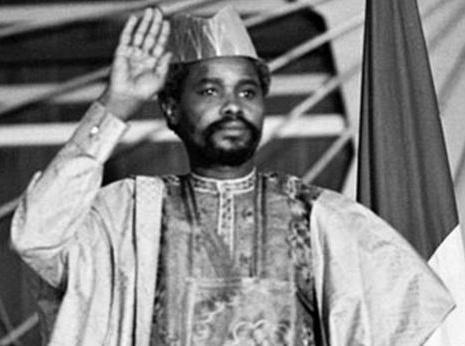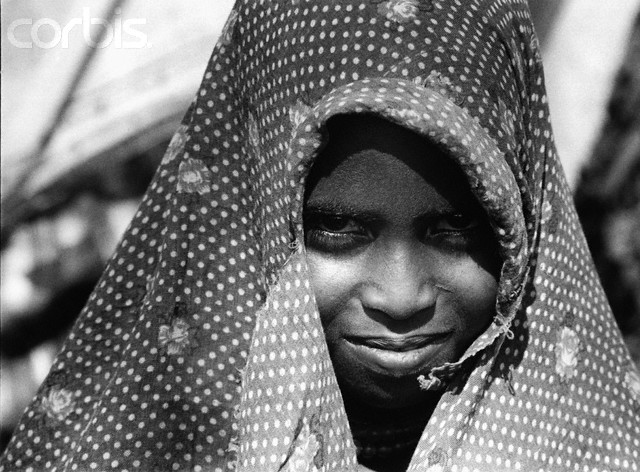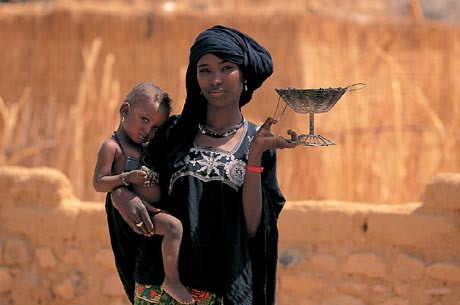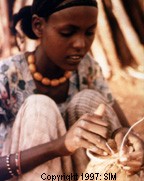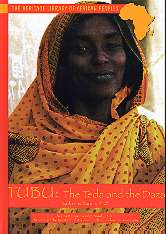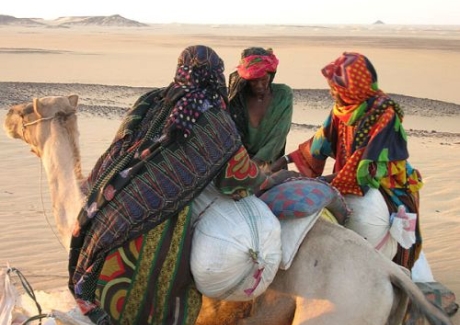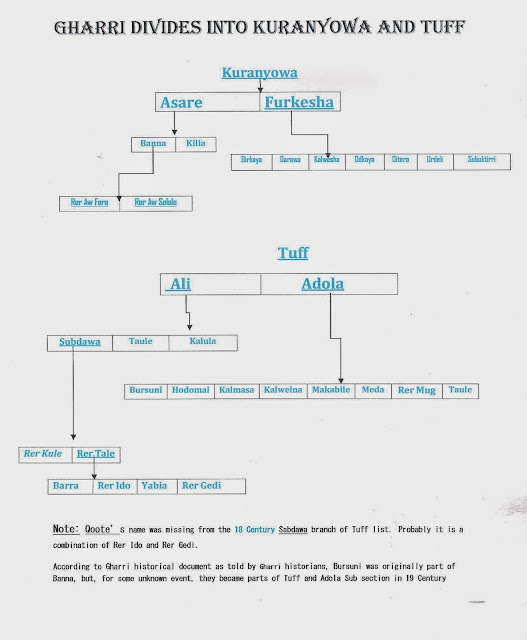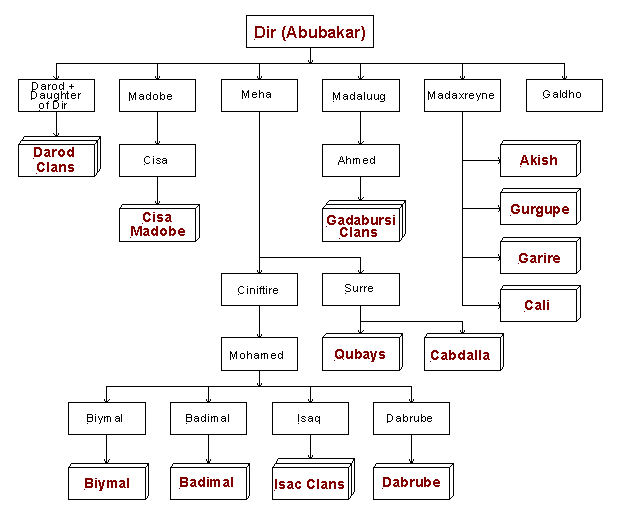Dagaaladii Xeraale, Afbarwaaqo, Towfiiq, iyo Galakacayo iyo Saxaafada Wexey ka Qoreen Barigaas:
IRIN Wednesday, 17 December 2003
At least 60 people were killed and another 90 wounded in renewed fighting on Tuesday in the northwest of Galgadud Region, according to local sources in the regional capital, Dhusa-Mareb.
The latest fighting broke out on between the Darod subclan of the Marehan and the Dir subclan of Fiqi Muhumud, and was concentrated in and around the village of Herale, some 80 km northwest of Dhusa-Mareb, said Nur Mu'allim Dhere, a member of the Dir clan.
Last month Herale, which is populated by the Suure Dir-Fiqi Mahmud, was also the scene of serious fighting between the two sides which left over 50 people dead.
Nur told IRIN that in the latest clash, 18 fighters on his side had been killed and 29 wounded, while the other side suffered 25 deaths.
Sources in Abud Waaq, 40 km west of the Herale, where the Marehan have taken their casualties, told IRIN that at least 30 dead and 70 wounded had been brought in.
According to sources from a neutral clan in the area, what started out as "revenge killings" had now flared up into a "fully-fledged land war".
"Basically, the Marehan want the Fiqi Muhumud out of the area, and until one group gives up, the fighting will probably continue," the sources said, adding that heavy weapons had been used in Tuesday's fighting.
Intensive mediation efforts on the part of elders and religious leaders from neutral clans seem to have failed. "We have been unable to bring the two sides together to start talking," said Ilmi Hirsi, a clan elder. "However, we are persevering with our efforts and hope that cooler heads will prevail."
The situation was reported calm on Wednesday, with both sides burying their dead and taking the injured to hospitals.
SACAD HABAR GIDIR - SUURE DIR-SALEEBAN CABDALLE WAR
NAIROBI, 10 Jul 2003 (IRIN) - Two days of heavy fighting in the south of Mudug region, have left at least 43 people dead and over 90 injured, a local journalist in the regional capital Galkayo told IRIN on Thursday.
The fighting broke out on Tuesday between the Sa'ad, Habar Gedir subclan and the Dir, and was concentrated in and around the villages of Towfiq and Awle, some 200 km east of Galkayo, the journalist Dahir Abdulkadir Aflow said. The two villages are populated by the Dir.
The clashes were triggered by revenge killings for the deaths of two Sa'ad men in Galkayo last week, but the ensuing escalation of violence was also attributed to disagreements over water and grazing in the area, Aflow said. "It is more about water and grazing land right now."
"Unfortunately, this is something that happens when nomads in search of pasture and water collide with each other," he said. This particular clash between the two clans had been "exacerbated by the easy availability of heavy weapons".
"Previously they used spears or guns but now both sides are using technicals [battlewagons fitted with heavy machine guns]," he said. "In an area with little cover for concealment, the casualty figures are bound to be high."
He added that the casualty toll was likely to rise once the fighting stopped and both sides could take their wounded to hospitals.
Abdullahi Dayib of the Dir clan told IRIN that among those killed from his clan were three women and four children.
The fighting has reportedly displaced hundreds of families who have no access to wells or water points, Dayib said. He stressed the need for help, "but given the lack of roads and current insecurity in the area, I doubt if anyone will come to their aid".
=======================================
At least 60 people were killed and another 90 wounded in renewed fighting on Tuesday in the northwest of Galgadud Region, according to local sources in the regional capital, Dhusa-Mareb.
The latest fighting broke out on between the Darod subclan of the Marehan and the Dir subclan of Fiqi Muhumud, and was concentrated in and around the village of Herale, some 80 km northwest of Dhusa-Mareb, said Nur Mu'allim Dhere, a member of the Dir clan.
Last month Herale, which is populated by the Suure Dir-Fiqi Mahmud, was also the scene of serious fighting between the two sides which left over 50 people dead.
Nur told IRIN that in the latest clash, 18 fighters on his side had been killed and 29 wounded, while the other side suffered 25 deaths.
Sources in Abud Waaq, 40 km west of the Herale, where the Marehan have taken their casualties, told IRIN that at least 30 dead and 70 wounded had been brought in.
According to sources from a neutral clan in the area, what started out as "revenge killings" had now flared up into a "fully-fledged land war".
"Basically, the Marehan want the Fiqi Muhumud out of the area, and until one group gives up, the fighting will probably continue," the sources said, adding that heavy weapons had been used in Tuesday's fighting.
Intensive mediation efforts on the part of elders and religious leaders from neutral clans seem to have failed. "We have been unable to bring the two sides together to start talking," said Ilmi Hirsi, a clan elder. "However, we are persevering with our efforts and hope that cooler heads will prevail."
The situation was reported calm on Wednesday, with both sides burying their dead and taking the injured to hospitals.
SACAD HABAR GIDIR - SUURE DIR-SALEEBAN CABDALLE WAR
NAIROBI, 10 Jul 2003 (IRIN) - Two days of heavy fighting in the south of Mudug region, have left at least 43 people dead and over 90 injured, a local journalist in the regional capital Galkayo told IRIN on Thursday.
The fighting broke out on Tuesday between the Sa'ad, Habar Gedir subclan and the Dir, and was concentrated in and around the villages of Towfiq and Awle, some 200 km east of Galkayo, the journalist Dahir Abdulkadir Aflow said. The two villages are populated by the Dir.
The clashes were triggered by revenge killings for the deaths of two Sa'ad men in Galkayo last week, but the ensuing escalation of violence was also attributed to disagreements over water and grazing in the area, Aflow said. "It is more about water and grazing land right now."
"Unfortunately, this is something that happens when nomads in search of pasture and water collide with each other," he said. This particular clash between the two clans had been "exacerbated by the easy availability of heavy weapons".
"Previously they used spears or guns but now both sides are using technicals [battlewagons fitted with heavy machine guns]," he said. "In an area with little cover for concealment, the casualty figures are bound to be high."
He added that the casualty toll was likely to rise once the fighting stopped and both sides could take their wounded to hospitals.
Abdullahi Dayib of the Dir clan told IRIN that among those killed from his clan were three women and four children.
The fighting has reportedly displaced hundreds of families who have no access to wells or water points, Dayib said. He stressed the need for help, "but given the lack of roads and current insecurity in the area, I doubt if anyone will come to their aid".
=======================================
Dagalkii AF Barwaaqo Reer Agoon Beesha Surre iyo Sacad
Ku dhawaad 50-ruux ayaa ku geeriyootay, tiro Boqol ruux kor u dhaafaysana way ku dhaawacantay dagaal shalay iyo dorraad ka dhacay tuulada Af-barwaaqo ee ka tirsan degmada Jariiban ee gobolka Mudug. Dagaalkan oo u dhexeeya maleeshiyooyin kala taabacsan beelaha Habargidir ee Sacad iyo Dir (Agoon) ayaa wuxuu ka bilowday aano qabiil iyo dilal horey u dhex maray labadaasi beel, kuwaasoo isu adeegsaday hubka waaweyn iyo kuwa fudud, waxaana la sheegayaa in dagaalkaas mindhiciro-dooxa ahi uu badankiis ka dhacay meel bannaan ah oo aysan jirin gabaad iyo meel kale oo rasaasta xooggan looga dhuunto, taasoo sababtay baa la yiri dhimashada iyo dhaawaca baaxaddaas laeg. Warku wuxuu sheegayaa in dhimashadu ay intii hore ka sii badan karto oo ay soo badanayaan dadka dhaawaca u dhimanaya, kuwaasoo dhiig bax iyo daawo la’aan u qur baxaya. Ma jiro ilaa iyo hadda cid nabadeyn ka dhex wadda labada dhinac ee dagaalamaya, marka laga reebo baaqyo afka kaliya ku kooban oo dhinaca saxaafadda loo sii marinayo, taasoo la og yahay in uusan dagaal ku joogsaneynin
================================================
Inter-clan fighting kills about 65 in Somalia Surre
MOGADISHU - Fighting between rival clans in southern and central Somalia has killed around 65 people in the past week, residents and radio reports said on Sunday. Eyewitnesses said several hundred heavily armed militiamen had been fighting in the central Mudug region for the past few days, killing at least 45 people and injuring many more, mostly civilians.
The fighting between the Dir and Sacad clans spread to at least 10 villages within a 20 km (12 miles) radius of Galcaio, a town some 570 km (350 miles) north of the Somali capital Mogadishu. Panicked residents fled their houses as a result of heavy shelling on both sides.
It was not immediately clear what sparked the fighting. Some residents said it was linked to the recent killing of a Sacad businessman by members of the Dir tribe. A Sacad leader told Reuters the fighting appeared to be subsiding on Sunday morning, after tribal leaders agreed on a ceasefire. In the Lower Shabelleh region south of Mogadishu, around 20 people were killed when fighting broke out earlier this week between the Jiddoh and Jareer clans over grazing rights, VHF radio reports said.
The two clans normally coexist relatively peacefully, but years of drought have heightened tensions in the region. Somalia has had no central authority since 1991, when dictator Mohammed Siad Barre was overthrown. A transitional government sits in Mogadishu, but controls only parts of the capital and pockets elsewhere.
The rest of the Horn of Africa country is a patchwork of clan-based fiefdoms, ruled by rival warlords and their heavily armed militias. The climate of insecurity, economic turmoil and drought have disrupted Somalia's normal agricultural and herding patterns, and caused serious food shortages. Aid agencies have warned any further disruption could cause a major humanitarian crisis. – Reuters
==============================================
Dec. 2003: A number of notable traditional leaders, supported by some prominent businessmen and women, leave Muqdisho to mediate warring clans in Galgudud region, central Somalia: an armed inter-clan conflict in Herale village (Dir against Marehan) on one hand and, the Murusade vs. Duduble in El-bur district
================================================
Reer Agoon Surre Dir
11 Jul 2003 – Clashes between two clans in central Somalia have claimed scores of lives since Tuesday. The fighting appears to be over access to natural resources. More than 50 people have died and 90 have been injured in clashes between two clans in the Mudug region of central Somalia. The fighting reportedly started when members of the Sa'ad sub-clan attacked the Saleeban Abdalle (Agoon) Dir clan for allegedly killing two of its members. But observers note that there was more to the clash than mere revenge. The senior United Nations relief official for Somalia Calum McLean says this is the second time in three months that there has been fighting in the area. "Now it's happened again," he said. "It's resource-based rather than political, you know, over grazing. It's over access to pasture and water." Observers say conflicts among the Sa'ad, Dir, and other nomadic groups over land and water for their cattle are not uncommon, but it is unusual for things to go so far. They say the easy availability of guns makes the death toll much higher than clashes in the past. The fighting comes at a time when Somali peace talks are being held in Kenya. Last year, representatives of clan-based factions signed a cease-fire while negotiations continued. The talks aim to end 12 years of civil war in Somalia. The country is split into areas ruled by warring clan leaders. For the past year, those warlords and other delegates have been in Kenya trying to resolve their differences, write a new constitution, and elect a new president and parliament. Mr. McLean says the United Nations agency is monitoring the situation in Mudug and urges Somali leaders to honor their commitments. "We're very alarmed by the escalation in the conflict and call for leaders to respect the ceasefire declaration," said Mr. McLean. United Nations sources report that the fighting.
Sa'ad, Habar Gedir subclan and the Surre Saleeban Cabdalle Dir
NAIROBI, 10 July (IRIN) - Two days of heavy fighting in the south of Mudug region, have left at least 43 people dead and over 90 injured, a local journalist in the regional capital Galkayo told IRIN on Thursday. The fighting broke out on Tuesday between the Sa'ad, Habar Gedir subclan and the Dir, and was concentrated in and around the villages of Towfiq and Awle, some 200 km east of Galkayo, the journalist Dahir Abdulkadir Aflow said. The two villages are populated by the Dir. The clashes were triggered by revenge killings for the deaths of two Sa'ad men in Galkayo last week, but the ensuing escalation of violence was also attributed to disagreements over water and grazing in the area, Aflow said. "It is more about water and grazing land right now." "Unfortunately, this is something that happens when nomads in search of pasture and water collide with each other," he said. This particular clash between the two clans had been "exacerbated by the easy availability of heavy weapons". "Previously they used spears or guns but now both sides are using technicals [battlewagons fitted with heavy machine guns]," he said. "In an area with little cover for concealment, the casualty figures are bound to be high." He added that the casualty toll was likely to rise once the fighting stopped and both sides could take their wounded to hospitals. Abdullahi Dayib of the Dir clan told IRIN that among those killed from his clan were three women and four children. The fighting has reportedly displaced hundreds of families who have no access to wells or water points, Dayib said.
NAIROBI, 30 Jan 2002 (IRIN) - About 40 people have been killed and 60 wounded in inter-clan fighting in the Mudug region of central Somalia, sources in the regional capital Galkayo told IRIN on Wednesday. The fighting was concentrated in and around the village of Afbarwaqo, some 200 km east of Galkayo, but has now died down. According to a local elder, Muhammad Salad Du'ale, the fighting - which broke out two weeks ago - occurred between the Sa'd sub-clan of the main Habar Gedir clan, and the (Saleeban Cabdalle Agoon)Dir clan. It was sparked off by revenge killings for the deaths of eight fishermen near Afbarwaqo, but the ensuing escalation of the violence was also attributable to the scarcity of water and grazing in the area, Du'ale said. He said neutral elders from Galkayo had managed to secure a ceasefire on Monday to allow for mediation to take place and to stop the fighting from spreading to other villages. "There has been no fighting in the last couple of days," Sheko Harir, a Dir elder, told IRIN from Galkayo. "The elders have met and talked to both sides, and direct talks between the belligerents are expected to begin soon." The violence has reportedly displaced hundreds of families, who have sought refuge in areas where "there is not a single well or water point", Sheko Harir said.
=================================================
Hishiis kadhacay Magaalada Caabudwaaq iyo Arimaha Xeraale oo sii xumaanaysa. Dhuusamareeb Feb-19-04
Maanta oo ay Taariikhdu tahay 2-18-04 Ayaa Idaacada BBCda sheegtay " in heshiis wayn uu ka dhacay Magaalada Caabudwaaq, heshiiskaa oo dhexmaray Labo Beelood oo katirsan Beesha Mareexaan." Hadaba beelahaa hishiiyay ayaa Dagaalkoodii ahaa Midkii hakiyay Dagaalkii Beesha Mareexaan ay kula jirtay Beesha Faqi-Muxamed (Degaanka Xeraale).
Waxaan qadka Telefoonka kula hadalnay Odayaal waaweyn oo katirsan Beesha FaqiMuxamed oo jooga Magaalada Dhuusamareeb, waxayna inoo sheegeen in heshiiskaa uu ahaa mid ay Beesha Mareexaan ku heshiiyeen in ay midoobaan isla markaana ay howshoodii(Dagaalkoodii) meesha ay ka wataan.
Odayaashaasha waxay intaa ku dareen in Shalayto ay isku dhaceen ciidamo ilaalo ah kaasoo Qasaare iyo dhaawac u gaytay Beesha Mareexaan. Waxay kaloo intaas ku dareen in Ciidamada laba Beelood ay isku horfadhiyaan labo meelood oo isu muuqda, Waxayna yiraahdeen hadii aan lahelin cidkala dhexgala waxaa macquul ah in ay sifudud iskugu dhicaan ciidamada.
Ilaa iyo Iminka lama sheegin wax waan waan ah oo kadhexsocda labada beelood iyo wax hadal haya intaba. Inkastoo Beesha Mareexaan ay horey ugu gacan sayrtay Culumaa'udiinadii, Suldaamadii, Nabadoonadii, iyo waxgaradkii isugu Jiray Beelaha wada dega Gobolka Galguduud ayaa wax rajo waan waan ah aan wali laga heyn, Halka Beesha Faqi-Muxamed ay Diyaar u yihiin heshiisiin dhexmarta iyaga iyo Beesha Mareexaan.
Dadka Degan Dagaanka Xeraale iyo kuwii ka qaxay Dagaaladii Kadhacay Halkaa ayaa iyagu aad u dhibaataysan oo cabsi weyna kaqabo dagaalo kale oo halkaa kadhaca. Dad ka soo waramay Xaaladaha Dadkii ka qaxay Dagaaladaa ayaa aad aga deyriyay oo Sheegay Dadka qaarkood oo u badan Caruur iyo dumar ayaa Caafimaadkoodu aad u liitaa Waxayna yiraahdeen "hadii aan Hey'adaha Samafalka Aduunka soo gaarin Dadkaa Qatar weyn ayay ku sugan yihiin.
Maxamed Abdi. Xeraale.com/Dhuusamareeb Dad gaaraya ilaa iyo 3500 oo qof ayaa waxay ku dhibaataysan yihiin Degaanka Xeraale Iyo Degmooyinka Dariska La’ah. Muqdisho, Soomaaliya. Feb-4-04 Warar naga soo gaaray Degaanka Xeraale iyo Degmooyinka dariska la ah ayaa sheegaya in dad tiradooda ay gaareyso ilaa 3500 oo qof ay ku dhibaataysan yihiin Halkaas.
Dadkaas oo ka qaxay Dagaalo goos goos ah oo kadhacaya Degaankooda (Xeraale) ayaa ku kala daadsan Degmooyinka Boholo, Dhuusomareeb, Huurshe, Mayeeraan, Iyo Qod-qod.
Afhayeen u hadlay Dadkaasi ayaa waxa uu u sheegay qaarkamid ah warfidiyeenada in dadkan ay mudo Sedeed bilood ah qoxooti yihiin oo aanay jirin haba yaraatee wax hay’ad samofal Bini aadanimo ah u fidiyay dadkaasi. Waxaa uu Afhayeenka intaa ku daray in dadkaasi ay u badan yihiin Caruur iyo Dumar ay aad ugu baahan yihiin Daryeel Caafimaadka iyo Raashin ay cunaan.
Waxaa kalee uu afhayeenku u sheegay warfidiyeenada in hadii aanay Hay’adaha Samofalka Aduunka u soo Gurman dadkaan ay Halis ugu Jiraan Gaajo iyo Cuduro.
Dagaalladii kadhacay Deegaanka Xeraale ayaa ahaa mid aad iyo aad u foolxun oo sababay Dhimasho iyo Dhaawac aad u farabadan. Maxamed Ali oo ku magacdheer (Shabeel ) ayaa waxa uu warfidiyeenada u sheegay in Dagaalka kadhexeeya Beelahan uu sii daba dheeraanayo oo weliba Ciidamadooda ay weli is hor fadhiyaan jiida hore.
Wararka waxay intaasi ku darayaan in Waxgaradka iyo Ganacsatada kasoo jeeda Degaanada Dhuusamareeb, Cadaado, Guraceel iyo Ceeldheer oo isku dayeey inay soo Afjaraan coolaadaasi ay ku guuldareysteen oo sheegay in Beesha kasoo jeeda Caabudwaaq ay ka biyo diidsan yihiin Hishiisiin. Wax garadka iyo Ganacsatada ayaa sheegay in hadana ay ku rajo wayn yihiin inay soo Afjaraan dagaaladaasi. Cabdiraxmaan Abdi Muqdisho, Soomaliya
Nin S.Abdalle Ah Oo La dilay
Nin lagu dilay agagaarka Baar ubax Dagaalada Mudug Awgood Muqdisho, Somaliya. Waxaa maanta lagu dilay meel udhow baar ubax nin dhailnyaro ah oo lagu magacaabi jiray indhobohol Diiriye Faarax,dad ka agdhawaa meesha lagu dilay marxuumka waxay ii sheegeen in dhalinyaro hubaysane ay kala soo degeen baabuur uu saarnaa oo ahaa kuwa loo yaqaan BLka isla markiina waxay ku fureen rasaas ilaa ay naftu ka baxdo.
Waxaana la xaqiijiyay in arrintu tahay ninka ladilay beeshuu ka dhashay iyo kuwa wax dilay in dagaal kharaari ku dhexmaray Golol oo ka tirsan gobalka Mudug gaar ahaan degmada Jiriiban,taasoo dad badani maanta fajac ku noqotay in dagaalkii baadiyaha la keeno magaalada Muqdisho.waana markii u horaysay oo labadaa beelood ay dad isaga dilaan magaalada Xamar iyadoo dagaalkoodu usocday in ka badan afar sano. Odayaal iyo waxgarad kasoo jeeda degaanka Golol ayaa cambaareyey Dilkaas Foosha xun,waxayna codsadeen in si wadajira loo soo qabto kuwii gaystey dilkaas oo aan loo eegin haybtay yihiin lana horkeeno shareecada islaamka si loo yareeyo kuwa caadaystay in ay dadka walaalaha ah isku diraan oo dhibaato hor leh ka dhexabuuraan,iyadoo hore loogu guulaystay in xabadii ka dhexsocotay labada beelood la joojiyo wada hadalna uu uga socday magaalada Gaalkacyo ,Dhacdadaan oo aad mooddo inay dhabarjab ku tahay waxgaradkii waanwaanta ka waday gobalka Mudug.
Xeraale
Faahfaahin ku saabsan dagaalkii lagu hoobtay ee Xeraale MOGADISHU, 16 Dec 2003 (MOL) -
Wararka naga soo gaaraya magaalada xeraale ee gobalka galgaduud waxay shegayaan in saakay saacaddu markay ahayd 6-dii subaxnimo waqtiga geeska afrika uu halkaas dagaal aad culusi ku dhexmaray labada beelood ee mareexaan iyo Fiqimuxumd(Dir), ka gadaal markii beeli soo qaaday duulaanka ayadoo aan ku qanacsanayn waan waan ay ka dhexwadeen masuuliyiin iyo waxgarad kale oo la degan degaanka .
Wararka lagu helayo fooniyaha waxay sheegayaan in ugu yaraan 45 qof ay ku dhinteen dagaalkaas, in ka badan 75 kalena ku dhaawacmeen, waxay kaloo sheegayaan wararku in dagaalka loo adeegsay hubkii dowladii hore oo ay kamid yihiin beebayaal iyo gawaarida gaashaaman, ayadoo mid ka mid ah beelaha halkaas ku dagalmaya ay maanta saxaafadda usheegtay inay ka qabsadeen waxay ugu yeereen kuwii soo duulay 4 beebe iyo hal dhesheeke, iyo ugu yaraan 20 qoryaha fududa.
Sida laga warqabo dagaal dad badani ku riiqdeen ayaa labadaas beelood ku dhexmarayay aagaas, kaasoo markiisii hore ka bilowday aano qabiil oo nin ganacsada ah lagu dilay magaalada Caabudwaaq, taasoo waxba kasuuroobi wayday dhexdhexaadin ay isku xilsaareen culumaaudiin iyo waxgarad isxilqaamay, dagaalka maanta ayaa lagu tilmaamay kii ugu kharasaaraha badnaa tan iyo intii ay beelahaasi coloobeen horaantii sanadkan.
Cabdi Xasan Mudugonline.com/Muqdisho
Xalad xeerale Conditions in Xeerale.
3/4/2004 2:38 PM UTC Massive Displacement in Central Region
NAIROBI, 24 Nov 2003 (IRIN) - Hundreds of families who were driven out of their homes by recent fighting in the Galgudud Region, central Somalia, are said to be living in "destitute" conditions. Local elders told IRIN the exodus was due to heavy fighting two weeks ago between the Darod subclan of the Marehan and the Dir subclan of Fiqi Mahmud. The clashes were concentrated in and around the village of Herale, some 80 km northwest of Dhusa-Marreb, the regional capital. Many of these 2,000 or so families were now living in the open, with little or no food, Abdiqani Shaykh Yusuf, a Dir elder said. "Many of them have lost all their livestock and now depend on the goodwill of the people of Dhusa-Marreb." The plight of the displaced is compounded by the prevailing drought in the area. "There have been no rains this year in Dhusa-Marreb and the surrounding areas," Yusuf Hasan Iyow, the governor of Galgudud, told IRIN on Monday. "The residents are hardly better off than the displaced," he added. "Most people here depend on livestock, which is dying now, because of the drought. Even business people are being affected." He said there was no aid agencies in the area helping either the displaced or the residents affected by the drought. Moreover, due to their weakened state, many of the displaced, particularly the young and elderly, were succumbing to disease, Abdirahman Ali, a health worker in Dhusa-Marreb, told IRIN. "Diarrhoea, malaria and respiratory infections are the most common diseases, and we are also seeing cases of very severely malnourished children," he said. "If they don't get help very soon, it may be too late." Meanwhile, mediation efforts are under way to resolve the conflict, Iyow told IRIN. "We have asked prominent elders and intellectuals from both sides to come from Mogadishu to help in the mediation," he said. He was hopeful that "this time round we will succeed, but it has been a very difficult meditation up to now." Posted on Monday 24th November at 11:59:55 Somali Puts Faith in High Court
===============================================
Sacad Habar Gidir iyo Surre Saleeban Cabdalle
WAR-SAXAAFADEED ANNAGA oo ah aqoonyahanno iyo indheergarad ka tirsan beelaha Sacad (Habargidir) iyo Surre (Dir Koonfurreed) oo ku kalsoon in aanu ka tarjumayno rabitaanka xubnaha beelaha aanu ka soo jeedno ee ku sugan dalka Canada; dareensan burburkii iyo dhibaatooyinkii ay ummadda Soomaaliyeed ka dhaxashay dagaal beeleedyadii ka dhacayey deegaanada dalkeenna; qadarinayna cawaaqib-xumada ka dhalan karta colaad baahda oo aan degdeg loo soo afjarin; xusuusan waajibka Islaamiga ah ee naga saaran ka qayb qaadashada xalinta khilaafaadka dadkeenna; dhowrayna duruufaha adag ee uu dalkeennu guud ahaan ku sugan yahay:
WAXAAN si buuxda u cadaynaynaa in aanu ka soo horjeedno dagaalka ka dhacay degmada Gaalkacyo, dagaalkaas oo laga dhaxlay dhimasho, dhaawac, barakac iyo burbur saameeyey dad iyo duunyaba; WAXAAN tacsi u diraynaa qoysaskii walaalaha ahaa ee waxyeeladu ka soo gaartay dhibaatadaasi; WAXAAN ugu baaqaynaa shacbiga deegaankaas wada deggen ee colaadu dhex martay xabad joojin, deegaankana laga saaro hubka waaweyn, isla markaasna si degdeg ah xal dhab ah looga gaaro khilaafka; WAXAAN ku dhiirigalinaynaa oday-dhaqameedyada, indheergaradka,aqoonyahanada, iyo culima’udiinka ka soo jeeda deegaankaasi in ay dardar galiyaan soo afjarida khilaafkan waxyeelada farabadan gaarsiiyey shacbi danyar ah duruuftii dowlad la’aanta iyo abaartu ugu darsantay colaadan sokeeye.
WAR-SAXAAFADEED ANNAGA oo ah aqoonyahanno iyo indheergarad ka tirsan beelaha Sacad (Habargidir) iyo Surre (Dir Koonfurreed) oo ku kalsoon in aanu ka tarjumayno rabitaanka xubnaha beelaha aanu ka soo jeedno ee ku sugan dalka Canada; dareensan burburkii iyo dhibaatooyinkii ay ummadda Soomaaliyeed ka dhaxashay dagaal beeleedyadii ka dhacayey deegaanada dalkeenna; qadarinayna cawaaqib-xumada ka dhalan karta colaad baahda oo aan degdeg loo soo afjarin; xusuusan waajibka Islaamiga ah ee naga saaran ka qayb qaadashada xalinta khilaafaadka dadkeenna; dhowrayna duruufaha adag ee uu dalkeennu guud ahaan ku sugan yahay:
WAXAAN si buuxda u cadaynaynaa in aanu ka soo horjeedno dagaalka ka dhacay degmada Gaalkacyo, dagaalkaas oo laga dhaxlay dhimasho, dhaawac, barakac iyo burbur saameeyey dad iyo duunyaba; WAXAAN tacsi u diraynaa qoysaskii walaalaha ahaa ee waxyeeladu ka soo gaartay dhibaatadaasi; WAXAAN ugu baaqaynaa shacbiga deegaankaas wada deggen ee colaadu dhex martay xabad joojin, deegaankana laga saaro hubka waaweyn, isla markaasna si degdeg ah xal dhab ah looga gaaro khilaafka; WAXAAN ku dhiirigalinaynaa oday-dhaqameedyada, indheergaradka,aqoonyahanada, iyo culima’udiinka ka soo jeeda deegaankaasi in ay dardar galiyaan soo afjarida khilaafkan waxyeelada farabadan gaarsiiyey shacbi danyar ah duruuftii dowlad la’aanta iyo abaartu ugu darsantay colaadan sokeeye.
WAXAAN ugu baaqaynaa in ay hay’adaha caalamiga ah gargaar degdeg ah ugu fidiyaan shacbiga deegaankaas ka soo baro-kacay iyo kuwa biyo la’aanta u liita.
BEESHA SACAD (HABARGIDIR) BEESHA SURRE (DIR KOONFUREED) Mahad Cali Xaashi Nasir Cabdi Baalle Nuuradiin Maxamed Maxamuud Maxamed Cali Aadan Cusmaan Ducale Kaahiye Saciid Axmed (Siciid Soona) Diini Nuur Shaadali (Jucufo) Abshir Diini Xassan Abshir Xildhibaan Mahad Cabdalle Cawad Dr. Cabduqaadir Maxamuud Guuleed Dr. Cismaan Yuusuf Maxamed (Jirfe) Eng. Cabdiraxmaan Maxamed Cilmi Sh. Mahad Max’ed Cali Wardheere Sh. Maxamed Sh. Cabdulaahi Maxbuub Cabdulaahi Xasan Aadan Jibriil Maxamed Siciid Dr. Axmed Xuseen Gurey
Dagaal culus oo subaxnimadii maanta ka bilowday tuulada Xeraale oo ka tirsan degmada Cabuud Waaq ee gobolka Galgaduud ayaa sababay dhimashada dad tiradooda lagu qiyaasay 45 qofood, iyadoo ay ku dhaawacmeen tiro kale oo aan la sheegin.
Dagaalladaan oo u dhaxeeya labo beelood oo halkaasi wada degan ayaa ka bilowday barkad biyaha laga cabo, iyadoo ay ka qeyb qaateen baabuurta dagaalka oo ay ku jiraan kuwo gaashaaman Afhayeen u hadlay beesha Mareexaan oo ay soo xiganeysay idaacadda Jubba ee magaalada Kismaayo ayaa sheegay in ay gacanta ku dhigeen degmada Cabuud Waaq, balse dagaallo teel teel ah ay ka soconayaan daafaha degmadaas, haseyeeshee ma jiraan warar caddeynaya hadalka sheegashada ah ee ka soo yeeray af-hayeenkaas. Wararkii ugu dambeeyay ayaa sheegaya in culumaa’udiin iyo odayaal ka kala tirsan labada beelood ay ku baaqeen in ay labada dhinac joojiyaan xabadda oo ay wada hadal ku dhameystaan khilaafaadkooda. Ugaaska Beesha Sade Ugaas Maxamed Weli Axmed Nuur oo ka mid ah waxgaradkaas ayaa isaga oo ku sugan Buulo Xaawo waxaa uu labada dhinacba ugu baaqay in ay joojiyaan dagaallada iyaga oo ixtiraamaya bisha barakeysan ee Ramadaan oo ay muslimiintu sooman yihiin.
Welcome To HornAfrik Online
Inter-Clan Clashes In Central Somalia.
At least 12 people were killed and 29 were wounded in the fighting. March 01, 2004 HornAfrik. Mogadishu Somalia At least 12 people were killed and 29 were wounded after fighting erupted between militias from rival clans in the village of Herale in central Somalia on Sunday, elders said. Village elder Ahmed Osman, contacted by radio on Sunday, described the fighting as "intense" and said that residents had fled Herale by the time the violence subsided in the afternoon, but with no ceasefire agreement.
The fighting pitted the Marehan against the Dir clans, who have previously lived side by side peacefully in Abudwaaq, a district in Somalia's Galgudud region. The latest clashes are part of tit-for-tat confrontations resulting from the April 2003 murder of a Marehan elder, allegedly by Dir clansmen.
The Dir are affiliated with the Southern Somalia National Movement (SSNM) of several sub-clan factions, while the Marehan belong to another factional grouping, the Somalia National Front (SNF). Both were among 27 factions that signed a ceasefire agreement in Kenya on October 27, 2002, to stop all hostilities in the war-torn Horn of Africa nation. Somalia plunged into clan warfare and has not had a recognized government since 1991 when the dictator Mohamed Siad Barre was toppled. Peace talks are continuing in Kenya
Afhayeenka ururka SSNM Md.Awliyo oo faahfaahin ka bixiyay dagaalkii Xeraale. Afhayeenka ururka SSNM Cabdullaahi Xuseen Aybakar kuna magacdheer AWLIYO ayaa ka waramay siduu udhacay dagaalkii dhexmaray beelaha Mareexaan iyo Fiqi Muxumed waxuuna yiri isagoo u waramayay saxaafadda: Goor hore oo ah subaxnimadii taariikhdu ahayd Febraayo 29,ayaa maleeshiyada beesha Mareexaan waxay sidii caadadu uahayd duulaan gardarao ah ku soo ekeeyeen dhammmaan wadooyinka laga galo magaalda xeraale,duulaankaas oo sida laga warqabo ujeedadiisu ahayd sidii loo baro kicin lahaa loona xasuuqi lahaa beesha Reer Fiqi Muxumed oo ku caana dad ehlu diina oo waliggod cid ku gardaraysan.Haddaba siday qabto diinta Muqadaska ah waxay ku qasbanaadeen inay reer Xeraale Difacdaan Maatadooda,Maalkooda iyo xurmada ilaahay u abuuray adoonkiisa oo ah inuuna wax dulmin isna qaadan dulmi. Haddaba markii uu dagaalku socday uga yaraan 5 saac waxay dantu ku qasabtay kuwii soo duulay ee dulmi wadayaasha ahaa inay cagaha wax ka dayaan iyagoo ku hungoobay hamigoodii ahaa inay xasuuq gaystaan isla markaana deegaan hantiyaan,beesha mareexaan oo ku caan baxday inay isku raacaan gardarada iyo duulaan lagu qaado dad kale sida ay ka marqaati kacayso taariikhdu oo 21kii sano oo ay dalka hogaaminayaan waxay soomaali u gaystaan la wada ogyahay, Waxuu afhayeenku xaqiijiyay oo uu yiri.waxaa halgamayaashii xaq udirirka ka shahiiday hal mujaahid halka labo kale ay ka dhaawacmeen oo dhaawacoodu mid khafiif yahay halka daaquudyada waa siduu hadalka udhigaye ay ka dhinteen 12 nin ugu yaraana ka dhaawcmeen 19 daaquud labo baabuur oo ah kuwa dagaalkana looga gubay dulmiwadayaasha mareexaan,Md.Awliyo waxaa caalamka iyo inta jecel nabada ugu baaqay in si wadajir ah loogu guntado sidii loo joojin lahaa gardarada iyo gumaadka ay wadaan beesha Mareexaan oo xitaa markii looga soo baro kacay degaanada lala degi jiray ee ku teedsanaa balanabal iyo Caabudwaaq ina hadda wadaan Isir sifayn (ethnic cleansing) ku aadan reer Fiqi Muxumed ayuu yiri afhayeenku. Waxuu kaloo afhayeenka SSNM aduunka caalamka ka codsaday in si degdeg gurmad loola soo gaaro qoysas badan oo ku baro kacay duulaankaas,iyagoo dadkaasi ayna haysan biyo iyo baad oo degaankii laga cabi jiray ay saameeyeen degaalkaas joogtada ah oo ay soo qaadayaan beesha Mareexaan.
Inter-clan fighting kills 14 in central Somalia
MOGADISHU (Reuters) - More than a dozen people were killed and many more were hurt when two clans clashed in central Somalia, residents and community elders said on Friday.
The Qubeys clan and the Suleyman sub-clan of the Habargidir clan started fighting the previous day in Amara village, 90 km north of the pirate base town of Haradheeere. The fight was over a dispute over land ownership.
“So far we know that 14 people died in the hostilities between the clans and more than two dozens were injured,” Mohamud Ali an Amara resident told Reuters by phone.
Abukar Dirshe an elder from the Qubeys clan said the fighting was sparked by long-standing hostilities over land ownership.
“We failed to reach accord with our neighbour so this resulted in deaths and still the area is too tense. There might be further clashes as war preparations are underway in nearby villages,” he said.
https://alchetron.com/Bacadweyne
12/01/2011
15 die in Somali rival clan feuds over water
FIGHTING between two Somali clans over access to water wells left at least 15 dead in 24 hours, residents say, as the dispute threatens to escalate further.
FIGHTING between two Somali clans over access to water wells left at least 15 dead in 24 hours, residents said today, as the dispute threatened to escalate further.
"At least 15 people were killed and many others wounded in the fighting, which was motivated by a dispute over the ownership of water wells in Baadweyn village," a local resident, Ahmed Hirsi, said.
Other witnesses also gave a minimum death toll of 15.
The fighting, which started late yesterday in the central Mudug region and continued this morning, pitted the Dir sub-clan of Qubeys against the Habr Gedir sub-clan of Suleiman, who are powerful among the region's pirates.
One local elder said he and his fellow community leaders were attempting to mediate a peaceful resolution but warned that the warring clans threatened to escalate the fighting.
"The elders are trying hard to resolve the crisis but both sides are amassing fighters from neighboring districts," said Awale Yasin.
He put the death toll at 18.
The clashes were apparently unrelated to any recent acts of piracy or kidnappings, nor were they linked to the current nationwide standoff between government troops and Islamist insurgents.
British couple Paul and Rachel Chandler, whose yacht the Lynn Rival was hijacked near the Seychelles on October 23, were being held hostage in separate areas in the Mudug region.
Violent clan feuds over livestock and access to water are common in the Horn of Africa country, where weapons are readily available and often used to resolve land disputes.
Other witnesses also gave a minimum death toll of 15.
The fighting, which started late yesterday in the central Mudug region and continued this morning, pitted the Dir sub-clan of Qubeys against the Habr Gedir sub-clan of Suleiman, who are powerful among the region's pirates.
One local elder said he and his fellow community leaders were attempting to mediate a peaceful resolution but warned that the warring clans threatened to escalate the fighting.
"The elders are trying hard to resolve the crisis but both sides are amassing fighters from neighboring districts," said Awale Yasin.
He put the death toll at 18.
The clashes were apparently unrelated to any recent acts of piracy or kidnappings, nor were they linked to the current nationwide standoff between government troops and Islamist insurgents.
British couple Paul and Rachel Chandler, whose yacht the Lynn Rival was hijacked near the Seychelles on October 23, were being held hostage in separate areas in the Mudug region.
Originally published as 15 die in clan feuds over water
Garowe Online berichtet im April 2010, dass mindestens 25 Menschen bei Zusammenstößen in Mudug zwischen den Clans der Dir und Habargidir getötet worden seien:
„At least 25 people, mostly fighters from both sides, are killed while dozens others wounded on Wednesday after inter-clan fighting broke out in a village in central Somali region of Mudug, reports say. The fighting started early Wednesday in Barag-Iise village, 80 km (50 miles) north of Haradheere town, a pirate stronghold where two clans, Dir and Habargidir residing from the same area disputed over animal watering point, leading to heavy confrontation between their heavily armed clan militia.” (Garowe Online, 1. April 2010)
Reuters berichtet im März 2010, dass über ein Dutzend Menschen bei Zusammenstößen zwischen den Clans der Qubeys und der Suleyman (Unterclan der Habargidir) in Zentral-Somalia getötet worden seien:
„More than a dozen people were killed and many more were hurt when two clans clashed in central Somalia, residents and community elders said on Friday. The Qubeys clan and the Suleyman sub-clan of the Habargidir clan started fighting the previous day in Amara village, 90 km north of the pirate base town of Haradheeere. The fight was over a dispute over land ownership.” (Reuters, 5. März 2010)
Introduction to The Powerful Surre Subclan Qubeys
Qubeys is a member
of the Surre (clan). Surre is one of the sons of the greater Mehe Dir Tribe.
Qubeys is brother to Abdalle Surre Dir. Surre (Abdalle & Qubeys)
Brief History & Overview
Qubeys , along with Abdalle, are a subclan of the Surre
(clan). Surre Mehe is a member of The Royal Dir tribe.
The Word Qubeys is an ancient Somali word which was once
common amongst the traditional Somali population. The word itself means
cleanliness. With the introduction of Islam and the Arabic language to Somalia
over 1000 years ago, Somalis changed the tradition of naming their sons Qubeys
to Dahir or Tahir or ? in Arabic which also means cleanliness.
The Qubeys and Abdalleh Surre Dir clans are known to have
spread and taught the Islamic religion in southern and central Somalia. With
the modern Somali society, it is believed that the Surre, both Qubeys &
Abdalle have a large number of Faq?h (Islamic Jurists) and Islamic scholars.
Distribution of Qubeys Clan in the Horn of Africa
It is believed by various historians the Qubeys Surre &
Abdalle Surre migrated from the northern part of Somalia currently known as
Somaliland approximately 1316 A.D. The Surre Clan migrated to parts of southern
and central Somalia as well as parts of Ethiopia and Kenya. However a small
fraction of the Qubeys clan remained in Somaliland and reside in Togdheer
Somaliland till this day.
Currently the Qubeys Clan reside in the following cities.
Some which they inhabit alone and some where they are the majority or a
significant population of the city:
•Bacadweyne Mudug
•Ceel-Xagar Puntland
•Significant amount reside in Galkacyo Mudug
•Marajiicley Galgaduud
•Kabxanley Hiiraan
•Baraag Ciise
•Qaycad
•Dhaah - Hiiraan
•Wardheen - Hiiraan
•Buuloburte - Hiraan
•Dheen
•Gawaaney
•Jaqey
•Qobor
•Jamaame
•Labaceel
•jiicdheere
•shabeelow
•Golweyn
•significant amount reside in (merca) lower-shabele
•Significant amount reside in Mogadishu Banadir
•Small cluster reside in Burco Togdheer Somaliland
•Koolo Ethiopia
•Bangale Kenya
•
Clan tree
•Dir
•Mehe
•Surre ◦Qubeys ◾Tolweeyne ◾Axadoowe
◾Abdalla
◾cusmaan
◾Reer Toonle ◾mohamed
abti-udug
◾waqantiile abti-udug
◾Yabadhaale ◾Midkasse
◾Idiris
◾Cusman afey
◾Wayaagle ◾reer
baani
References
Mudug Conflict Over Pasturelands Fueled by Weapons From Region
Clan fighting over pasturelands between two rival Somali sub-clans in central Somalia has triggered revenge killings, land disputes and conflicts and claimed the lives of at least 15 people on Wednesday.
Residents of the region informed Somalia Report that more than 25 others were injured in fighting that began on Wednesday afternoon in the rural areas between Amaara and Ba’adweyne villages in Somalia’s Mudug region.
Most of the injured are the disputing tribesmen, according to the residents. They were admitted to hospitals in the Galkayo and Hobyo Districts.
The area is calm as of Wednesday evening, although the two pastoral communities are arming for future rural clashes, according to Mukhtar Hussein Ahmed, a resident of Galhure village near Amaara.
He said the fighting was between two armed militias from the Saleebaan and Qubeys sub-clans who had been fighting in the rural areas during the last two years. “The latest clashes were provoked by revenge killings, disputes over pasture lands and water in the countryside between Amaara and Ba’adweyne villages in Central Somalia,” Mukhtar said.
He added the fighting started near Amaara village, and spread to the surrounding rural areas. The residents of Galhurre confirmed to Somalia Report that the rural communities living in that area are fleeing their homes due to the heavy fighting, with shells from mortars and firearms endangering their homes.
An elder from the Qubeys sub-clan of Dir has strongly criticized the administration of Himan & Heeb, based in the Adaado District of Galgaduud region, for arming rural communities to instigate the conflicts between the two sub-clans.
“The administration is equipping the pastoral communities with weapons and armored vehicles,” Mohamed Abdi Ahmed, an elder from one of the sub-clans told Somalia Report by telephone. “Elders from the two sub-clans have stepped in to help resolve the repeated conflicts, and negotiations have started to settle the situation,” he added.
Somali rural communities are largely livestock herders, and conflicts and deadly clashes over grazing lands and water are common plights among the Somalia’s many clans.
Somalia Report tried to contact the administration of Himan & Heeb to address the fighting between the two sub-clans in central Somalia, but they were not available for comment.
Most of the injured are the disputing tribesmen, according to the residents. They were admitted to hospitals in the Galkayo and Hobyo Districts.
The area is calm as of Wednesday evening, although the two pastoral communities are arming for future rural clashes, according to Mukhtar Hussein Ahmed, a resident of Galhure village near Amaara.
He said the fighting was between two armed militias from the Saleebaan and Qubeys sub-clans who had been fighting in the rural areas during the last two years. “The latest clashes were provoked by revenge killings, disputes over pasture lands and water in the countryside between Amaara and Ba’adweyne villages in Central Somalia,” Mukhtar said.
He added the fighting started near Amaara village, and spread to the surrounding rural areas. The residents of Galhurre confirmed to Somalia Report that the rural communities living in that area are fleeing their homes due to the heavy fighting, with shells from mortars and firearms endangering their homes.
An elder from the Qubeys sub-clan of Dir has strongly criticized the administration of Himan & Heeb, based in the Adaado District of Galgaduud region, for arming rural communities to instigate the conflicts between the two sub-clans.
“The administration is equipping the pastoral communities with weapons and armored vehicles,” Mohamed Abdi Ahmed, an elder from one of the sub-clans told Somalia Report by telephone. “Elders from the two sub-clans have stepped in to help resolve the repeated conflicts, and negotiations have started to settle the situation,” he added.
Somali rural communities are largely livestock herders, and conflicts and deadly clashes over grazing lands and water are common plights among the Somalia’s many clans.
Somalia Report tried to contact the administration of Himan & Heeb to address the fighting between the two sub-clans in central Somalia, but they were not available for comment.
During this year, the conflict between the two sub-clans of Qubeys and Saleebaan has killed at least 80 people, including women and children.
Somalia: Over 40 Killed in Fighting in Central Region
10 July 2003
Nairobi — Two days of heavy fighting in the south of Mudug region, have left at
least 43 people dead and over 90 injured, a local journalist in the regional
capital Galkayo told IRIN on Thursday.
The fighting broke out on Tuesday between the Sa'ad, Habar Gedir subclan
and the Dir, and was concentrated in and around the villages of Towfiq and
Awle, some 200 km east of Galkayo, the journalist Dahir Abdulkadir Aflow
said. The two villages are populated by the Dir.
